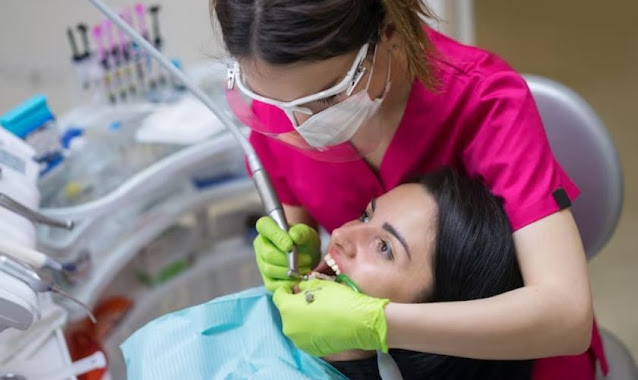Urgent Needs Emergency Dental Services in Denton
Let's face it, dental emergencies are the unwelcome guests we never plan for. One minute you're happily munching on an apple, the next you're dealing with a throbbing toothache or a chipped tooth that looks like it belongs in a Jack-o'-lantern, not your mouth.
According to a study by the National Institute of Dental and Craniofacial Research, nearly 2 million people experience dental emergencies each year in the United States alone. That's a lot of unexpected dental drama!
But here's the good news: you don't have to suffer in silence (or with throbbing pain). There are options available to get you the urgent dental care you need, and fast.
This blog will be your guide through the world of emergency dental services. We'll cover what constitutes a dental emergency, where to find urgent care, and even offer some tips on what to do while you wait for your appointment.
So, whether you're experiencing a sudden toothache or have a chipped tooth that's putting a damper on your smile, keep reading for all the info you need to get the situation under control.
What Exactly is a Dental Emergency?
Not every dental issue requires an immediate trip to the dentist. But some situations require prompt attention to prevent further complications or alleviate severe pain. Here are some of the most common dental emergencies:
- Severe toothache: This one's a no-brainer. If you're experiencing a throbbing or persistent toothache that's making it difficult to eat, sleep, or concentrate, it's time to see a dentist ASAP.
- Knocked-out tooth: Time is of the essence here! If you knock out a tooth, it's crucial to see a qualified dentist in Denton within 30 minutes to increase the chances of saving it.
- Dental abscess: This is a pus-filled infection at the root of a tooth that can cause significant pain, swelling, and even fever. Urgent dental care is needed to drain the abscess and treat the infection with antibiotics.
- Broken or cracked tooth: Depending on the severity of the break or crack, you might need immediate attention to address the pain and prevent further damage to the tooth.
- Lost or broken filling or crown: A lost or broken filling or crown can leave your tooth vulnerable to decay and infection. While not always a life-or-death situation, it's best to get it addressed by a dentist as soon as possible.
- Severe bleeding or trauma to the mouth: If you experience significant bleeding or trauma to your mouth from an accident or other incident, seek immediate medical attention to stop the bleeding and assess any potential damage.
Finding Urgent Dental Care: Your Options
Now that you know what qualifies as a dental emergency, let's explore your options for getting urgent care:
- Your Dentist's Office: Many dentists reserve emergency appointments or have after-hours emergency numbers. Even if your dentist's regular office hours are closed, it's worth calling to see if they offer emergency care or have an answering message with instructions.
- Urgent Care Dental Centers: These walk-in clinics specialize in treating dental emergencies. They're often a good option if you don't have a regular dentist or your dentist's office is unavailable.
- Emergency Room: While not ideal for routine dental emergencies, emergency rooms can provide initial treatment for severe pain, bleeding, or facial trauma. However, keep in mind that emergency rooms are typically overwhelmed and prioritize life-threatening conditions. You might experience a long wait time before receiving dental care.
Preparation is Key!
While emergencies can't be entirely predicted, there are ways to be prepared:
- Maintain a relationship with a dentist: Regular checkups and cleanings allow your emergency dentist in Denton to monitor your oral health and identify potential issues early on.
- Know your dentist's emergency protocol: Most dental offices have after-hours numbers or instructions for contacting them in case of an emergency.
- Keep a dental emergency kit: This kit could include pain medication, gauze pads, a small mirror, and a dental hygiene product like a mild antiseptic mouthwash.
Tips for While You Wait for Your Appointment
Here are some tips to help manage your dental emergency while you wait for your appointment:
- Pain Relief: Over-the-counter pain relievers like ibuprofen or acetaminophen can help manage pain.
- Cold Compress: Apply a cold compress to the affected area to reduce swelling and discomfort.
- Saltwater Rinse: Make a saltwater rinse by mixing a teaspoon of salt with warm water. Swish gently for 30 seconds to help clean the area and reduce inflammation.
- Avoid Irritants: Stay away from foods and drinks that are hot, cold, sugary, or acidic, as these can further irritate the affected area.
Remember: When in doubt, it's always better to err on the side of caution and seek professional dental care. Early intervention can often prevent more serious problems down the line.
Conclusion
Dental emergencies can be stressful, but with the right knowledge and resources, you can navigate them effectively. Remember, prioritizing your oral health is an investment in your overall well-being. By acting quickly and seeking professional care, you can minimize discomfort, prevent complications, and get back to smiling with confidence.




"The post is very useful to me as it contains some descriptive knowledge about child dental service. Thanks a lot for sharing such helpful post. Keep Posting.
ReplyDeleteemergency dentist Woodbridge "